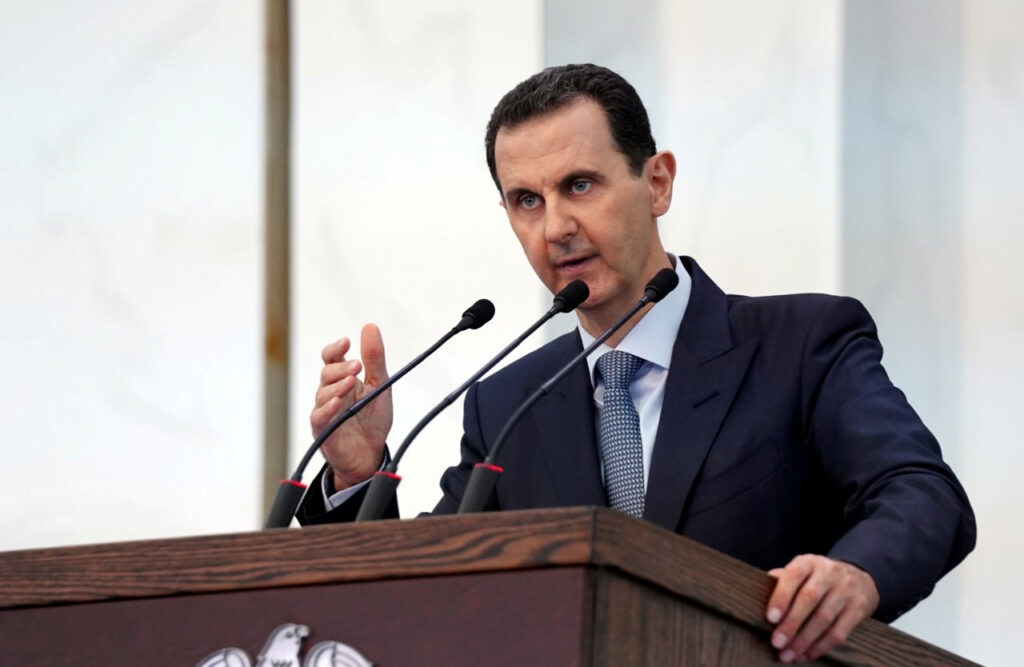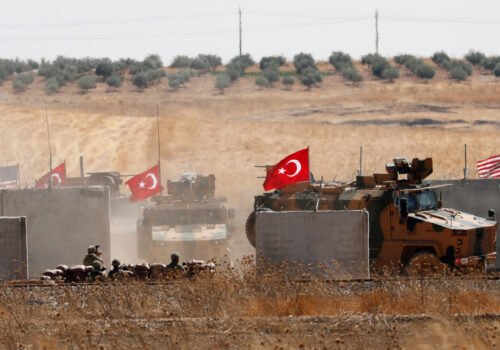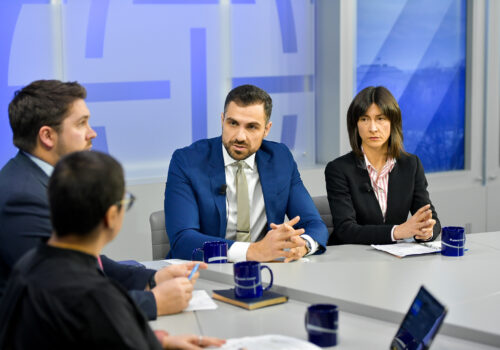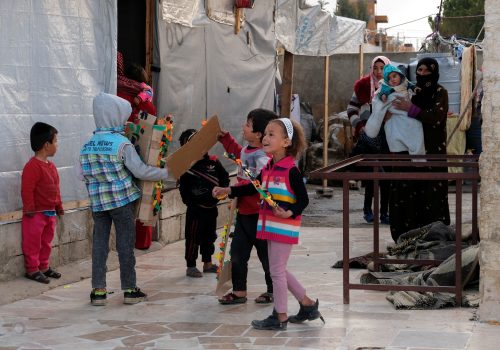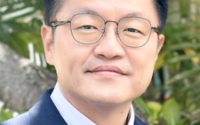Is the Assad regime finally facing some justice? What to know about the trial of Syrian officials in Paris.
The road to accountability for the violence and destruction that the Bashar al-Assad regime has perpetrated in Syria over the past dozen years has been long and circuitous. But few people probably expected that road would run through Paris. On Tuesday in the French capital, a landmark trial began of three former Syrian intelligence officials charged with torture, murder, and other crimes.
Below, Joumana Seif, a nonresident senior fellow with the Atlantic Council’s Strategic Litigation Project, answers five pressing questions about the legal proceedings and their implications far away in Damascus. Seif is a Syrian lawyer and legal advisor for the International Crimes and Accountability program at the European Centre for Constitutional and Human Rights.
1. Why is this trial happening in Paris?
The trial focuses on crimes committed against two French-Syrian nationals, a father and son who were disappeared by Syrian authorities in 2013, detained and tortured at the Mezzeh military airport detention facility, and ultimately killed by Syrian authorities. Three suspects are on trial—Ali Mamlouk, who was the head of Syria’s National Security Bureau; Jamil Hassan, the former director of Syrian air force intelligence; and Abdel Salam Mahmoud, who previously led investigations at the Mezzeh military airport detention center.
The charges brought against the officials are for numerous war crimes and crimes against humanity, including murder, torture, and enforced disappearance. These represent crimes that Syrian authorities systematically carry out in detention facilities across Syria. In particular, the trial will focus on violations by Syrian air force intelligence and its detention center at the Mezzeh military airport, which is where some of the most grave crimes have been committed in Syria, including murder, severe torture, and sexual violence.
The trial is happening in Paris because the victims are French nationals, and France is one of the few countries that allows trials in absentia. These types of trials are very important because they help combat impunity. In a situation like Syria, where senior officials won’t leave the country as long as Assad and his regime remain in power, there is no opportunity to arrest the highest-level perpetrators. Holding a trial for their crimes, even if they are not present, can provide a sense of justice to the victims of their crimes. Some officials will never be tried in person, and in absentia trials provide the only way to ensure legal accountability for their crimes. Without in absentia trials, many victims would be prevented from seeking justice.
2. Have similar trials taken place?
This is the first trial of senior Syrian regime officials. Trials for crimes in Syria have occurred in Germany and other countries under the principle of universal jurisdiction. However, these countries all require the perpetrator to be present in the country in order for the trial to take place. As a result, the trials that have taken place so far have focused on low- or mid-level officials. These cases are important for accountability. However, the responsibility of these lower-level officials is very different from the responsibility of senior officials.
We know that from the beginning of the Syrian revolution in 2011, the three suspects on trial in Paris were responsible for giving orders and giving a green light for other officers under them to commit crimes in detention facilities and elsewhere. This trial is examining the role of the highest-level perpetrators who are directly connected to Assad and are among his small inner circle. This trial will establish the systematic method of the crimes and the responsibility of Syrian leaders and institutions, who were representing the Syrian state and Assad regime in carrying out their crimes.
3. How does this trial fit into the broader attempts to hold Assad’s regime accountable?
This trial is the result of years of Syrian and international civil society organizations supporting witnesses and survivors, collecting documentation and evidence, and advocating for accountability. Syrians have been working for justice and accountability for more than thirteen years now, since the revolution in 2011. In this time, Syrian and international civil society have gathered a lot of evidence and established the truth on violations throughout the conflict. Some of the evidence includes the Caesar photos, regime documents collected by the Commission for International Justice and Accountability, reports by the United Nations (UN) Independent International Commission of Inquiry on Syria, and the work of the UN International, Impartial, and Independent Mechanism on Syria. There have been around eighty trials for crimes in Syria held in European and other countries, against suspects linked to the Syrian regime and nonstate actors, including the Islamic State. This is a lot of trials, but it is not sufficient or satisfactory given the crimes that have been committed.
After thirteen years, Assad is still in power, and results from accountability processes are not so tangible. Compared to the crimes that have been committed—atrocities and massacres, resulting in millions of victims who are still suffering—there has been very little accountability.
This trial of senior officials, highlighting systematic crimes, will help close some of the gaps and will be a big step on the path to accountability. We know the path will be long. But this trial will give a big push toward accountability. It will remind the international community of the gravity and scale of crimes that have been committed in Syria, and the need for accountability for victims and survivors, and for the future of Syria.
During the four days of trial, the court will review the evidence openly, in front of the public and the media. It will provide an opportunity to remind the world of what has happened in Syria and what is still going on. It will also be a reminder of why accountability and a political solution are important for Syrians and why these steps are a precondition for peace. The accountability work being done now will help prepare for the future and transitional justice.
4. What is the potential impact of this trial if the defendants aren’t present?
This trial is so important for victims and survivors, and for Syrians in general, the majority of whom have been impacted in one way or another by the conflict. The trial will help establish the truth. It will provide a legal record, with evidence that has been examined and proven, of crimes that have been committed and people who are responsible. The trial will help establish which people—which perpetrators—should not and cannot be acceptable leaders for the future of Syria.
The trial will also help raise the Syria cause on the international agenda and remind countries that are supporting normalization with the Assad regime of the nature and cruelty of his regime. It will help remind the international community that his regime is not accepted by many Syrian people and show why a political transition is so important for Syrians. The trial will help remind everyone of the demand for a political transition, and why it must happen.
5. What are the next steps for accountability for Syria?
There should be more arrest warrants for suspects. Even if it’s not possible to try perpetrators in their presence, there should be arrest warrants and trials held in absentia. Even the issuance of arrest warrants is an important step, as this only happens after the conclusion of a long investigation, supported by significant evidence and lengthy examinations. Arrest warrants can offer some preliminary proof that these individuals are responsible for grave international crimes. They can help for the future of Syria by making clear to Syrians and the international community who cannot be a part of Syria’s future.
I hope that this trial and other accountability proceedings can help convince democratic countries that the Assad regime will never change, that it cannot change and be transformed to a democratic state, that those in the Assad regime are criminals, and that they should not be a part of any future government in Syria.
The United States, European countries, and the UN can do a lot more to support a democratic future for Syria. Right now, they are supporting the Assad regime indirectly by contracting with individuals and entities linked to the regime, including sending millions of dollars to the Syria Trust for Development, which is run by Bashar al-Assad’s wife, and other organizations linked to human rights violators. I hope this will change and that donors will implement better practices for vetting contractors to ensure this money does not end up funding the regime. On top of that, democratic countries must put a real strategy in place to support the Syrian people and push for a democratic transition in government. Trials like this one in Paris—the evidence they present and the violations they highlight—help demonstrate why this is necessary and hopefully encourage further action.
Further reading
Tue, Feb 20, 2024
Here’s what an uncoordinated US withdrawal from Syria would look like. It’s bad for many partners, but especially Turkey.
MENASource By Ömer Özkizilcik
An uncoordinated withdrawal from Syria by the United States could pose significant risks for Turkey, leaving the country alone against Iran and Russia.
Fri, Mar 29, 2024
Launching the Syria Strategy Project
Event Recap By JP Reppeto and Charles Johnson
On March 18, 2024, the Atlantic Council’s Syria Project, the Middle East Institute’s Syria Program, the European Institute of Peace, and Madaniya Civil Society Network launched the Syria Strategy, an intensive process of engagement with subject matter experts and policymakers in the United States, Europe, and the Middle East to develop a holistic strategy to […]
Tue, May 16, 2023
Syrian refugees fear normalization with Assad. Because it means they will have to return—and not by choice.
MENASource By Arwa Damon
Syrian refugees fear that “normalization” of ties will boost the narrative that “Syria is safe now,” giving further justification to rid Syrian refugee populations.
Image: Syria’s President Bashar al-Assad addresses the new members of parliament in Damascus, Syria in this handout released by SANA on August 12, 2020. SANA/Handout via REUTERS
